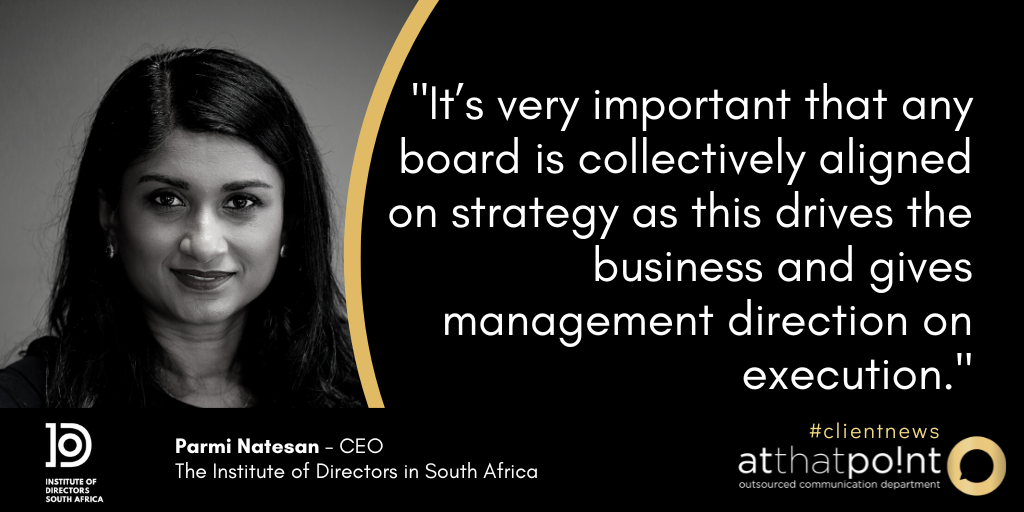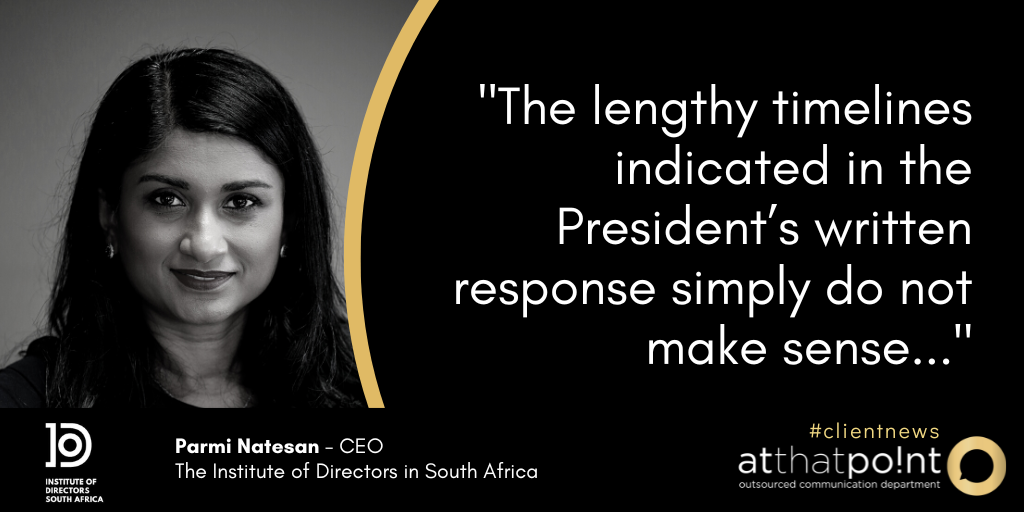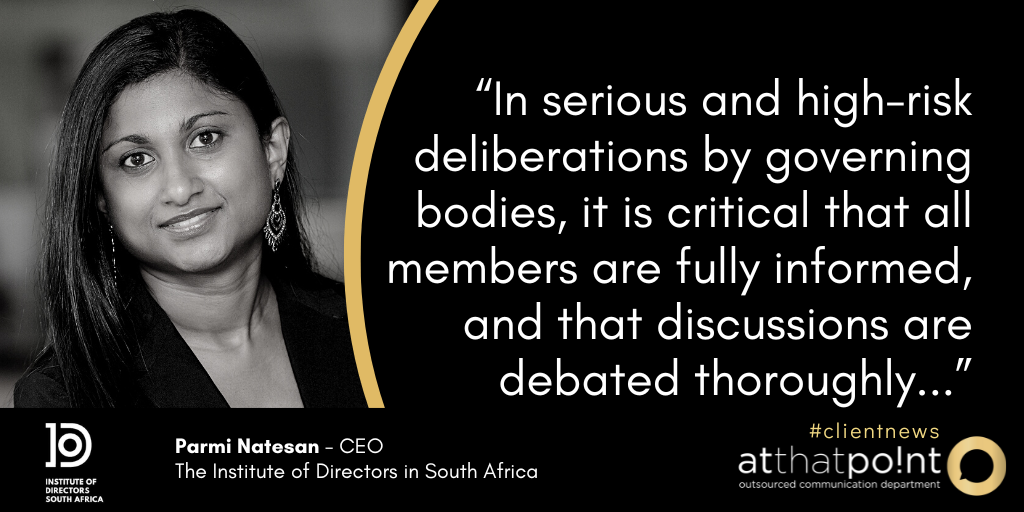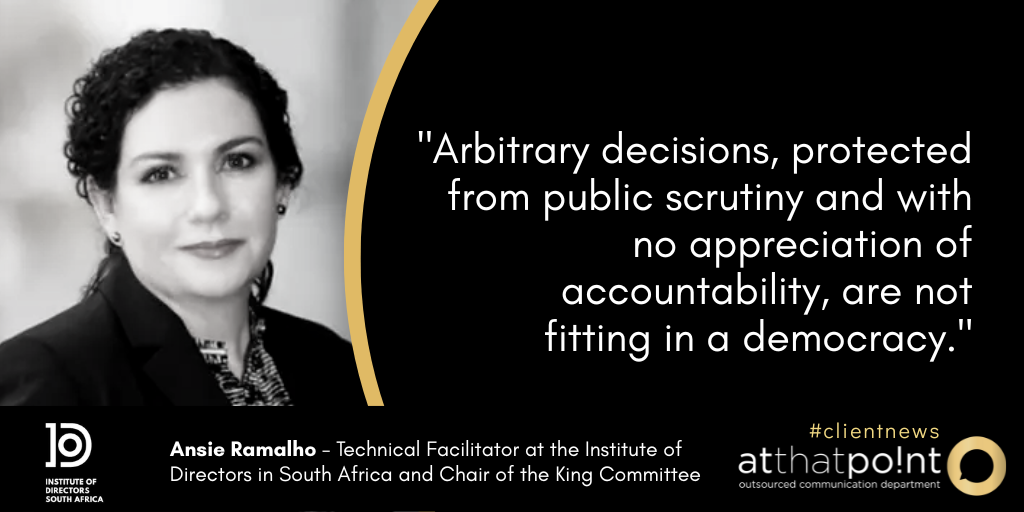 Events at Huge Group, as reported in the media, hold important governance lessons for all organisations, says Parmi Natesan, CEO: the Institute of Directors in South Africa (IoDSA). Reports stated that at a recent board meeting, the chairman and two other directors resigned with immediate effect, apparently over disagreements relating to corporate strategy. “It’s very important that any board is collectively aligned on strategy as this drives the business and gives management direction on execution. It’s therefore not surprising that vehement disagreement on strategy would lead to a parting of the ways,” comments Ms Natesan. “Another obvious takeaway is that the departure of three experienced non-executive directors at once is a major loss of institutional knowledge for any company, something that it will take a long time to recover from—a well-thought-out board succession plan is clearly vital.” When the news of the resignations broke, the simultaneous appointment of three substitute directors was also announced. On the one hand, this may indicate that a succession plan was indeed in place, or it may have been just quick action, Ms Natesan believes. “Whilst the speed of finding replacements is to be applauded, one has to consider whether this was a missed opportunity for better demographic diversification on the board. After the new appointments, the board’s composition remains all male and majority white—this despite both the JSE Listings Requirements and King IV referring to targets and reporting on racial and gender diversity on boards,” she says. There is widespread agreement that a diverse board does more than tick boxes and create a good impression. For example, 86% of respondents in a recent research survey believe that board diversity contributes to better board performance, while 77% link board diversity and improved corporate performance. Overall, 73% of respondents noted that their company was taking action to increase board diversity. The research also indicates that investors are starting to ask questions about board diversity. Globally, just over a third (35%) of investors request such information, with this question most likely to be asked in Europe (43%). Investors are most likely to ask about boardroom diversity in relation to mega-cap (71%) and large cap (57%) companies.[1] “Common sense tells us that the more lenses through which a board can examine the world, the better. There’s also interesting research that links a company’s financial performance and gender and skill diversity on the board,”[2]concludes Ms Natesan. “This is a complex topic, but it’s clear that boards need to investigate it fully and, most importantly, have a succession plan that reflects their conclusions and resulting diversity goals.” [1] Corporate Secretary, “Boardroom diversity: From disclosure to recruitment”, available at https://content.corporatesecretary.com/story/cs-boardroom-diversity-from-disclosure-to-recruitment/page/1. [2] Khaled Hosny, Adel Elgharbawy, “Board diversity and financial performance: empirical evidence from the United Kingdom”, Accounting Research Journal (17 June 2022), available at https://www.emerald.com/insight/content/doi/10.1108/ARJ-02-2020-0037/full/html. ENDS MEDIA CONTACT: Stephné du Toit, [email protected], 084 587 9933, www.atthatpoint.co.za For more information on the IoDSA please visit: Website: www.iodsa.co.za Twitter: @The_IoDSA LinkedIn: Institute of Directors South Africa Company Page Facebook: Institute of Directors South Africa
0 Comments
 In his long-awaited plan to address the Zondo Commission’s recommendations, the President has set unwarrantedly long timelines in place for the establishment of better processes for selecting board members for state-owned enterprises (SOEs), says Parmi Natesan, CEO of the Institute of Directors in South Africa (IoDSA). “The Zondo Commission quite rightly found that the appointment and removal of board members and senior executives are being manipulated to facilitate state capture. This is an issue that the IoDSA has been highlighting for several years now and, more to the point, we have put in a lot of work with Government to provide solutions,” she says. “The lengthy timelines indicated in the President’s written response simply do not make sense, especially given the urgency of the matter.” In his response, the President indicates that Government accepted the need for “a process for the appointment of boards of state-owned enterprises that is not open to manipulation”. This process will involve independent panels with the appropriate technical expertise to recommend suitable candidates. Crucially, the “Guide for the Appointment of Persons to Boards and Chief Executive Officers of State-Owned and State-Controlled Institutions” that such panels would use will only be finalised in the 2023/24 financial year. “The President’s timeline is too long given the urgent need to begin repairing our SOEs; it’s also unwarranted because the Guide was apparently finalised in early 2019 after input from the IoDSA, among other organisations,” says Parmi Natesan, CEO of the IoDSA. “I can accept that there would be a need to revisit the document in the light of the Zondo Report, but this could be done rapidly. The IoDSA stands ready to work with the Department of Public Service and Administration to get this done, and certainly before the end of the current financial year. The work is largely done, assuming that the recommendations originally made by the IoDSA are in the existing version of the guide, why the delay?” She adds that she assumes that the independent panel would include representation from the IODSA which represents directors and is responsible for setting and maintaining the standards of professionalism amongst its members. The IoDSA is also the custodian of the King Code of Corporate Governance, which also continues to provide internationally respected guidance, including the governance of SOEs. The government also proposes the establishment of a central database of potential candidates, but this is again a duplication of work that has already been done, Ms Natesan continues. The IoDSA’s database of individuals who have obtained one of its two certifications—Certified Director and Chartered Director—already exists. These certifications offer a way to identify individuals who have been found to possess the professional skills and personal qualities necessary to act as directors based on the IoDSA’s Directorship Competency Framework. “I’m sure I don’t speak just for the IoDSA when I say that we are growing weary of responding to the Government’s requests for help in sorting out the governance mess at the SOEs and not seeing any action,” Ms Natesan concludes. “We implore the government not to reinvent the wheel here—much of the work needed to put a proper process for making credible board appointments is already done. The country cannot afford any further delay.” [1] The full text of the speech is available at https://www.gov.za/speeches/president-cyril-ramaphosa-response-president-cyril-ramaphosa-commission-inquiry-allegations. ENDS MEDIA CONTACT: Stephné du Toit, [email protected], 084 587 9933, www.atthatpoint.co.za For more information on the IoDSA please visit: Website: www.iodsa.co.za Twitter: @The_IoDSA LinkedIn: Institute of Directors in South Africa Company Page Facebook: Institute of Directors South Africa The full text of the speech is available at https://www.gov.za/speeches/president-cyril-ramaphosa-response-president-cyril-ramaphosa-commission-inquiry-allegations. The King Committee and the Institute of Directors in South Africa (IoDSA) are calling on President Ramaphosa to honour his undertaking to submit his response plan to the Zondo Commission’s 358 recommendations by 15 October.
“The speed with which the Zondo Reports were released sent an important message about how important these reports are. It is a message that could be seriously undermined should the recommendations not be acted upon with the same sense of urgency,” says Ansie Ramalho, Chair, King Committee on Corporate Governance for South Africa. “The President’s recent hints that the slight delay in the Commission’s submission of its final report could impact on the timeframe of four months imposed by the courts to announce government’s response is somewhat worrying.” Ms Ramalho says that the King Committee would like to see the President address key issues relating to leadership. Generally speaking, the Zondo Reports show that a lack of leadership—from the President, Parliament, ministers and boards, both in the public and private sectors —lies at the root of state capture. “The King Committee would like to see the President define the role that shareholder ministers must play in ensuring that SOE boards have ethical and competent and effective members. Shareholder ministers need to be held accountable for following a fair and transparent process when they make board appointments. King IV’s Supplement for state-owned entities contains good guidance,” she says. “Arbitrary decisions, protected from public scrutiny and with no appreciation of accountability, are not fitting in a democracy. The President should make this clear in his response.” The King Committee strongly argues that making board appointments based on politics, ideology or patronage results in the enrichment of the few at the cost of the many. Parmi Natesan, CEO of the IoDSA adds that the broader question of what criteria should be used when making board appointments should also be addressed. Board members bear a heavy responsibility and general business proficiency in a particular industry is not enough. Directors pre-eminently need to possess specific competencies as professional directors, as outlined in the IoDSA’s Director Competency Framework. Without these professional competencies, in addition to appropriate industry experience, they will not be able to fulfil their role and legal duties effectively. “Attention should be given to ensuring that boards contain individuals with a diversity of opinion and experience able to offer different perspectives and inspire more robust debate towards the goal of better decision-making,” added Natesan. “King IV defines governance as ethical and effective leadership, or differently put, ethical and competent leadership. Failures of leadership at every level enabled state capture, and the King Committee expects that the President’s response to the Zondo report’s recommendations are timeous and will address this core issue effectively,” says Ms Ramalho. ENDS MEDIA CONTACT: Stephné du Toit, [email protected], 084 587 9933, www.atthatpoint.co.za For more information on the IoDSA please visit: Website: www.iodsa.co.za Twitter: @The_IoDSA LinkedIn: Institute of Directors in South Africa Company Page Facebook: Institute of Directors South Africa UCT Council reports demonstrate the importance of following good governance practices—IoDSA11/10/2022  Reports of the unfolding developments at the University of Cape Town suggest deviations from governance best practice, says the Institute of Directors in South Africa (IoDSA). These include that the UCT Council “was split down the middle about the need for an independent judicial commission of enquiry into allegations of mismanagement and poor corporate governance”,[1] and that potentially implicated members of the Council were allowed to cast a vote in the matter. A key principle of good governance is that individuals on governing bodies need to be aware of conflicts of interest, and declare them upfront. Conflicted governing-body members should then recuse themselves from any business or decisions that relate to their conflict. King IV makes this very clear. Principle 1 of King IV is that “The governing body should lead ethically and effectively”, with Recommended Practice 1 (a)(ii) reading: “Members of the governing body should avoid conflicts of interest. In cases where a conflict cannot be avoided, it should be disclosed to the governing body in full at the earliest opportunity, and then proactively managed as determined by the governing body and subject to legal provisions.” An IoDSA guidance note goes on to advise that “A key function of a chair is to manage conflicts of interest. It is not sufficient merely to table a register of interests. All internal and external legal requirements must be met. The chair must ask affected directors to recuse themselves from discussions and decisions in which they have a conflict unless they are requested to provide specific input, in which event they should not be party to the decision.” In this instance, if the reports of potentially implicated Council members being allowed to vote on a matter that concerned them intimately are true, this would constitute a departure from governance best practice. Certainly, a large section of the Council seems to believe that such an unethical decision was taken, and has gone public with its disagreement. This in turn is attracting unfavourable media attention, and may imperil the ability of the governing body to function effectively in the future. Whatever the rights and wrongs, the very existence of such a profound split in a governing body on such an important matter is also a concern. “In serious and high-risk deliberations by governing bodies, it is critical that all members are fully informed, and that discussions are debated thoroughly and ultimately culminate in a decision that has the backing of the entirety, or at least the vast majority, of the governing body which is collectively responsible,” concludes Ms Natesan. [1] Andriaan Basson and Marvin Charles, “UCT crisis deepens as 13 top council members slam ‘irregular, flawed’ meeting”, News 24 (7 October 2022), available at https://www.news24.com/news24/southafrica/news/breaking-uct-crisis-deepens-as-13-top-council-members-slam-irregular-flawed-meeting-20221007. ENDS MEDIA CONTACT: Stephné du Toit, [email protected], 084 587 9933, www.atthatpoint.co.za For more information on the IoDSA please visit: Website: www.iodsa.co.za Twitter: @The_IoDSA LinkedIn: Institute of Directors South Africa Company Page Facebook: Institute of Directors South Afric |
Archives
July 2024
Categories
All
|


 RSS Feed
RSS Feed